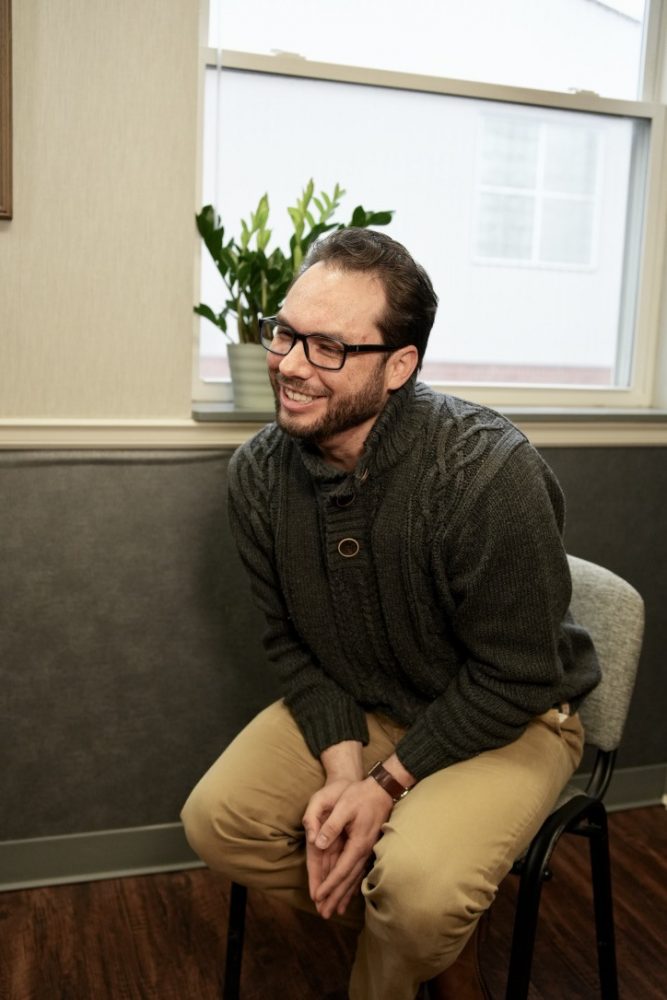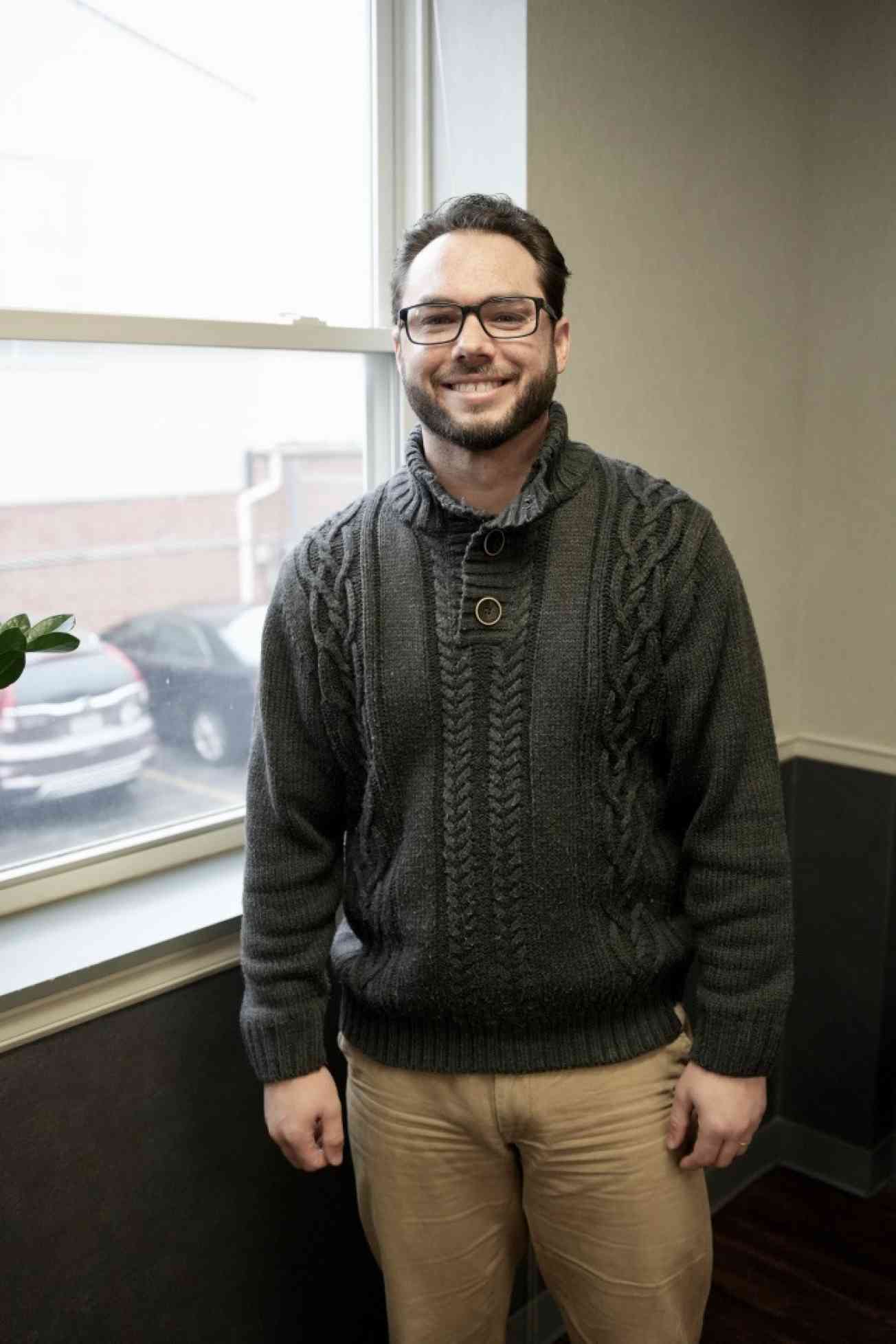I See You, I Want to Know You
How Refugees Weave Color into Our Communities

My name is Ryan Hudnall, the Executive Director at Della Lamb Community Services. I joined Della Lamb because of a trip I took in 2017 to Lebanon. While there, a friend of mine and I were hosted by a kind man named Pastor Muhammad.
He and his family were giving their lives away to care for Syrian refugees. They met physical needs, relational needs and encouraged spiritual contemplation. They welcomed saying, “I see you, I want to know you,” which is such a powerful message.
Pastor Muhammad wanted to be a wonderful host and show us the beauty of Lebanon. It’s a gorgeous country. We went to this world-class vineyard with immaculate amenities, where you see the beauty of the place, the quality of the wine. Then, on the way back, we passed by a small Syrian refugee community.
I began to reflect, “How can these two places exist right here together?” And it was in those moments that I thought about my own city, where the same juxtaposition occurs.
He took us to various camps. At one particular camp, we were invited by a Syrian refugee to have tea in a canvas tent and reflect on what life looked like. It was the Syrian refugees’ hospitality that changed the trajectory of my life.
When I arrived back home to Kansas, I joined Della Lamb, an organization in Kansas City that empowers refugees and aids in helping its clients meet the challenges of education, employment and self-sufficiency in an ever changing world. Our vision is that every person is seen, respected, loved, and nourished in an environment that supports their own empowerment.
There are several ups and downs when considering refugee assistance and what it looks like on a political, social, and community level. In my time here we have seen both the lowest period of resettlement and the highest period of resettlement since the 1970s. During COVID-19 refugee resettlement was around 11,000 nationally. And then, we had Operation Welcome where we were welcoming 80,000, from Afghanistan. And now, we’ve increased efforts to hit that 125,000 marker that President Biden established.
At Della Lamb we’re formerly receiving 300. But, the number that we receive per month can vary dramatically. This month, January, we’re receiving 61, another we might receive 15. That puts a lot of pressure on the teams - on our housing. So this volatility even within the year means that our team is constantly having to respond to flux rather than having a stable environment which would allow us to better plan and work with our families. I would strongly advocate to create more stability in the system.
We also try to address the potential second tragedy of resettlement. And that tragedy is isolation.
To leave a family in isolation adds a different level of trauma. And so, volunteers, simply in relationship with newcomers, are fundamentally critical to the social emotional health of those we’re welcoming. People that will see, someone that will walk, someone that will be a friend, someone that offers a smile, are fundamentally important.
We’ve created new pathways called co-sponsorship, where volunteers, after proper vetting, will provide the case management services. They can spend time with the families in ways that our case managers might not be able to, they’ll simply reflect - how do you shop for groceries? Let me show you. This is a credit card, this is a bank, or whatever it is.

We believe there’s room for everyone. Bring your gifts and learn what newcomers bring to our community.
The week of Thanksgiving 2021, we welcomed 100 people in a four day period. So when I speak of volatility, it’s not just infrastructure, but also just the number of people required to welcome well.
During this surge we discovered that there were long standing health issues that had not been addressed for many refugees. So we launched a health and wellness team that was specifically designed to address and respond to health issues. But I believe leaders don’t delegate burdens, but share and assume them.
My team assessed - and they had done enough, it was my turn. So on my birthday, December 27, 2021, I found myself sleeping in a hospital, navigating healthcare issues with one of our newest neighbors from Afghanistan.
It was a long night. We waited in the waiting room for four hours. But, I think that relationship has a role in helping to navigate all of life’s challenges and trauma. I’ll tell you what, I’m the lucky one that has a different relationship with this gentleman because we shared a night together in the hospital. He wasn’t left with fear, with uncertainty and in pain, alone. And I get a different kind of joy. I think that’s the whole point of this right? When we lose our lives, we find them. And that was the case.
Refugees come to us full of hope. They have great determination and are willing to work hard to achieve their goals. Over the past two years, 90% of the families that enter our workforce development programs achieve self-sufficiency in 8 months. These are those with significant language barriers, stepping into a workforce context that is wildly different from their country of origin, and they are hitting economic self-sufficiency within eight months. It reflects upon the spirit of those that we are welcoming. There’s so much to celebrate.
Each day I get to be a broker of hope. I get to dream with people, find joy with people.
Just a few weeks ago I was in contact with a family from Iraq. Because of a housing shortage, this family was actually staying with a volunteer family who had designated a portion of their home simply to welcome people. This family from Iraq, after staying with the volunteer family, was feeling stressed about moving to a new home and a new community. They had already been through so much uncertainty. I was able to reflect with the mom, who was terrified. I let her know that we were supporting her, and that her family and her life had great meaning for us. Afterwards, she was feeling much more at peace, even excited about going to their new community. I always think that joy is not finite, but it multiplies. So their joy is our joy.
It’s my opinion that Kansas City is a better place because of its refugees. Just look at the rich people groups. So much of culture and reflections on culture is like a glacier. You see the 10% but there’s 90%. What would our food scene look like without refugees? A couple of years ago, Forbes named Kansas City as having the best tacos in the country. If you have barbecue and tacos as your two mainstays, life gets pretty good.
Just down the street from Della Lamb is the Vietnam cafe, Pho. That Vietnam Cafe wouldn’t exist, if we hadn’t welcomed those from Vietnam in the 1970s - people now see it as a mainstay of Kansas City. We’re not just shaping the city today. We’re shaping the city 50 years from now. There will be richness because of our efforts to welcome people now.
I have another example. East High School, right here in Kansas City, has not been historically successful in terms of its sports or academic pursuits. This year, East High School won state in soccer. It was an amazing story. People were celebrating. Who was on their team? Refugees and immigrants. We’re tapping into a whole new giftedness and skill set that is elevating Kansas City and it is refugees and immigrants that led the way. There’s so much that’s offered in friendship, new skills, understanding the world, and a push back against our very individualistic society to a more communal way.
If we step into our own fear, offer presence and allow for presence, we discover something different. We shouldn’t listen to the loud voices that drive the negative narrative, we simply need to pay attention to the quiet movement that honors the dignity of everyone on the globe. We overcome the complications in this sector with love. It is as simple as that.
Our team members obtain informed consent from each individual before an interview takes place. Individuals dictate where their stories may be shared and what personal information they wish to keep private. In situations where the individual is at risk and/or wishes to remain anonymous, alias names are used and other identifying information is removed from interviews immediately after they are received by TSOS. We have also committed not to use refugee images or stories for fundraising purposes without explicit permission. Our top priority is to protect and honor the wishes of our interview subjects.